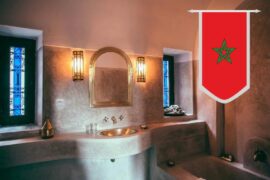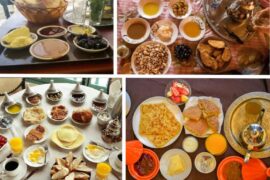The kingdom of Morocco is located in the north of Africa where most of the population are Muslims and Moroccan traditions are very different from those of non-muslim majority countries. The tourism industry is among the important industries in the country. Most Moroccans are open-minded and respectful toward foreigners but being aware of the Dos and Don’ts in Morocco is a must to avoid being misunderstood and show respect for the Moroccan culture.
List of Some Dos and Don’ts in Morocco
Moroccan people are friendly and they may not tell you what you did is a don’ts or considered rude in Morocco. So, we are listing some useful advice and cultural rules to behave more in harmony with the Moroccan culture in your daily life in the kingdom:
- What religions are in Morocco?
The majority of the Moroccan population are Sunni Muslims belonging to the Maliki School (Maliki madhhab) and there are also minorities from the other Abrahamic religions, Judaism and Christianity.
NB: In all Moroccan big cities, you can find synagogues and Churches.
- Do I have to respect the Call to prayer?
Like all Muslim majority countries, a call to prayer is something you will hear 5 times a day in a loud voice from the mosque’s loudspeakers and it lasts around 2 minutes. So, for example, if you are receiving at your place your Moroccan friends or family and listening to something out loud, you can lower the volume or turn it off until the call to prayer is finished. They may not ask you to do it but they will appreciate doing it.
- Do not talk bad about Religion and the King.
The practice level of Islam (99% of the population) varies from one person to another but talking bad about religion and also about the King is something to avoid.
- Do I have to speak DARIJA in Morocco?
Wherever you go, if you speak the local language, you will enjoy more your stay in the country. In Morocco, people speak DARIJA, the Berber language, and the Hassani dialect spoken in the south Sahara of Morocco.
Regarding foreign languages, most Moroccans speak French because of the historical colonial events that happened in the 20 century, and English is spoken mostly by educated people. In northern Morocco, Spanish is widely spoken because of the influence of Spanish culture on this part of the Kingdom.
NB: DARIJA also called Moroccan Arabic, is a mix of Standard Arabic, Berber, French, and Spanish. For DARIJA and Moroccan Culture, you can book your online private classes if you are interested.
-
Do not kiss in public in Morocco.
Moroccans are not used to kissing in public areas and as a foreigner visiting Morocco with western culture, kissing is something normal but to be respectful to locals, it’s better to avoid that and also excessive shows of affection unless it’s done in private.
- Do females have to cover up in Morocco?
As a female tourist in Morocco, it’s better to avoid wearing sexy clothes revealing too much of your body unless you’re on the beach.
- How to greet a person in Morocco?
You can greet a Moroccan man or woman with a handshake and as a man, it’s better to not try to kiss a Moroccan woman on the cheek. Traditionally, kissing on the cheek is between the same gender and this rule is more respected in Berber culture.
- Can you hold hands in Morocco?
Yeah, you can hold hands in Morocco.
- Are tattoos accepted in Morocco?
Doing permanent tattoos is not accepted in most Moroccan households because it’s forbidden in the religion of Islam. So, if you have many tattoos on body parts you can hide by clothes, it’s better to do that, especially if you are going to visit a traditional Moroccan family.
- What foods do they eat in Morocco?
Moroccan cuisine is famous worldwide and Moroccans are used to eating with their hands and bread in most of the dishes. Some of the famous delicious foods are Couscous, Tagines, Tangia, Rfissa, Bastila, Harira, Mechoui,…etc. For more details, you can check our posts about Famous Moroccan dishes and Popular Street Food in Morocco.
- Can I eat in public during Ramadan?
- Why do Moroccans eat with their right hand?
The origin of eating with the right hand is the religion of Islam and the left hand is considered unclean because it’s used in the toilet to clean private parts. So, most Moroccan families are strict toward their children from a very young age to eat with their right hand. So, as a non-muslim, it’s not really that you have to eat with your right hand but if you are eating with locals and you enjoy behaving and following the Moroccan culture rules, you can do it.
- No pics of people without permission.
If you want to take pictures of someone or make videos and you are recording people randomly, it’s better to ask for permission because that may be annoying and nobody likes it.



